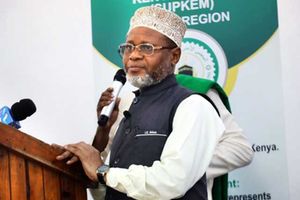
Supreme Council of Kenya Muslims National Chairman Al-Hajj Hassan Ole Naado (center) with his deputy Muhndhar Shariff (left) and Secretary General Sheikh Abdullahi Salat at a media briefing on May 12, 2025.
A row has erupted between Hajj and Umrah travel agents in the Coast region and the Supreme Council of Kenya Muslims (Supkem).
The agents have accused the organisation of sidelining them in planning meetings, threatening blacklisting, and interfering with the operations of licenced agencies.
The agents also blamed Supkem for failing to address the difficult conditions faced by Kenyan pilgrims during the 2025 Hajj, including shared beds despite full payment for accommodation, a shortage of buses for transportation and relocation to a less strategic zone than the one traditionally assigned.
Addressing journalists in Mombasa on Wednesday, deputy chairperson of the Kenya Hajj and Umrah Agents Association Coast branch Abdulkadir Al Ubeid, said they were excluded from a July 5 consultative meeting held in Nairobi. The meeting was convened to evaluate the 2024 Hajj operations and prepare for the 2026 pilgrimage.
“They only included 11 agents in the meeting, yet we are 65 licenced agents in Kenya. Most of us, especially from the Coast, were locked out. It is unacceptable,” said Mr. Al Ubeid.
“In previous years, we were always invited. This year, we were completely left out, yet we handled 1,800 out of the 4,500 pilgrims who travelled for Hajj that is 40 per cent,” he added.
Fairness in operations
The agents further accused Supkem of trying to take over their roles despite being a regulatory body.
“Supkem was given the responsibility to ensure fairness in operations, but they’re now using that power to suppress legitimate businesses. That’s not acceptable,” said Mr Khalid Abdulrahman, director of Alharamaini Travel Agency.
However, Supkem National Chairperson Hassan 0le Naado denied the accusations and instead stated that Coast-based agents were failing to meet Saudi Arabia’s new requirements.
“Hajj is not political, it is a religious process. Every year, we conduct evaluations of how Hajj was managed, who contributed what and who met the standards set by the mission and the Saudi government,” Mr Naado said.
“One of the new requirements is that, to run a Hajj company, you must be able to carry no fewer than 500 pilgrims. None of the Coast-based agents met that threshold,” he added.
Mr Naado also pointed to deep divisions among Coast agents saying mistrust among them prevented the formation of a single strong agency that could meet the required threshold.
“Instead of forming a unified agency, they ran to Nairobi and joined various groups. That’s not our fault, it’s theirs. They had the opportunity to consolidate their efforts into a large organisation but they did not,” he said.
He said agents working under the Hajj mission are expected to handle at least 300 pilgrims but none from the Coast met that requirement.
On the issue of blacklisting, Mr Naado confirmed that seven agents had been deregistered across the country this year. Three are from the Coast, three from North Eastern and one from Nairobi — citing various violations.
“One was involved in forgery, another charged extremely high visa processing fees and another was so abusive they nearly assaulted people in Minnah. Each had different violations, not a single issue,” he said.
He also refuted claims that Supkem owed money to agencies.
“We don’t have any pending debts. If someone feels the council owes them there are proper legal channels. They can go to court because we are not operating in a banana republic,” he said.
Misleading content
Mr Naado further cautioned agents against filming misleading content while in Saudi Arabia claiming that some record videos at sacred sites and circulate them out of context.
“Some agents go to holy sites and take fake videos. That is outside the agreement with Saudi authorities. Media coverage is allowed but only with official journalist accreditation. You can’t just take videos of people worshipping and share them misleadingly,” he warned.
“When you see scenes from Minah or Arafat, it may look chaotic. There are no hotels or beds. But that’s the real nature of those holy places. People who have never gone there might misunderstand it as mismanagement, which is false,” he added.
Supkem said that the Saudi government does everything within human limits to make Hajj comfortable and that misleading content undermines those efforts.
Mr Naado also clarified that Supkem deals only with recognised consortiums ,12 in total , that group agents under umbrella organisations.
“We don’t deal with individual complaints unless they come through group leaders. There are no common issues across all agents; everyone has their own internal matters,” he said.
Coast-based agents, however, are calling for more transparency, inclusivity and respect from the council, warning that continued exclusion could harm both the industry and the spiritual welfare of pilgrims.






